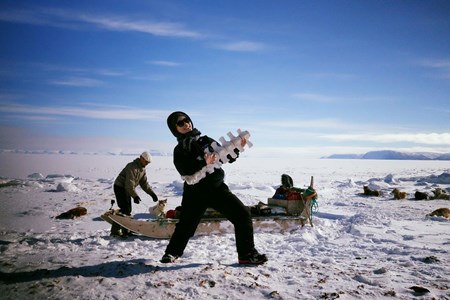After completing my bachelor's degree in Korea, I started in my first master’s program in Cultural Heritage Studies at University College London (UCL). My interest towards Greenland was not just simple curiosity, and I wanted to know more about the place, academically and deeply. So, I decided to study and learn more about Greenland. In 2013 I finished my master’s degree, including my dissertation on Greenland’s cultural and natural heritage affected by climate change. After that I went back to Korea and got a job related to cultural heritage, but it was far from Greenland and I still missed it so much. Eventually I came to Greenland and started in my second master’s program called West Nordic Studies at Ilisimatusarfik (University of Greenland). That was 2015, the year that I will never forget – the year when the second chapter of my life started.
I’ve had a lot of amazing opportunities, not only in the Arctic and Nordic countries but also in Korea. First, I was able to do two exciting and fantastic north2north internships in the Arctic during my studies. The first one was at the UArctic Research Liaison and Thematic Networks Office at the University of Oulu in Finland. The second was at the Arctic Economic Council (AEC) Secretariat in Tromsø, Norway.
During my first internship in Oulu, I mainly helped with projects run by the researchers at the Thule Institute. One of the most exciting experiences was preparing for a symposium held at the university. I learned not only by doing practical arrangements, but also by meeting various Arctic researchers with whom I was able to share knowledge and discuss Arctic matters. That’s when I learned for the first time that it was all about networking. For a student who had just started to study in the Arctic, it was a very precious time.
During my second internship at the AEC Secretariat, I felt like I was upgraded. Despite the size of the Secretariat, the tasks are broad. Thanks to the staff, I was able to share my voice and participate and contribute a lot to the organization. And when good results were shown, I felt high satisfaction.
Another thing I learned during both internships was that by changing my location I was able to think from a different angle. When I was in Greenland, I used to think from the Greenlandic perspective, and I received more news from Greenland. However, when I was in Finland and in Norway, I was able to think from their perspectives. This helped me a lot.
While studying in the Arctic, I have gained academic knowledge about the region and new experiences but also opportunities to work as a writer. Since I am the only Korean in Greenland, I started to work with Korean magazines to share my stories. In addition, I worked with a Korean TV documentary team to make episodes about Greenland for Korean audiences. I travelled with the team from Narsarsuaq, South Greenland to Qaanaaq, North Greenland in both summer and winter. I have also learned that many people who study or work in the Arctic have never been to Greenland. I feel totally lucky to have those precious experiences, and I want to help people know and understand Greenland and the Arctic properly. For instance, the Arctic is not a desperate place where climate change always attacks, but a very dynamic and vibrant area with a lot of economic potential. Currently I am working on a book about Greenland in the Korean language.

Everyone has their own pace in life. When I moved to Greenland, I was not young, and because of that I was able to settle down here. If I hadn’t experienced other places, I might not have been able to come here with a strong will. By sharing my voice, I hope more people from different backgrounds want to become involved with the Arctic and work for a better future. My twenties were filled with travelling, and I used to ask myself what to do with my life. After completing my current master's thesis on the Arctic Economic Council and Arctic economy this summer, I would love to pursue a PhD degree and keep studying international relations in the Arctic.
After travelling around the Arctic, there are no more places where I would want to go. The Arctic makes me feel safe – this is where I belong. In early 2018, I got married to a Greenlandic guy, and now I call the Arctic my home. And of course, I love my home.
Originally published in the UArctic Shared Voices Magazine 2019
